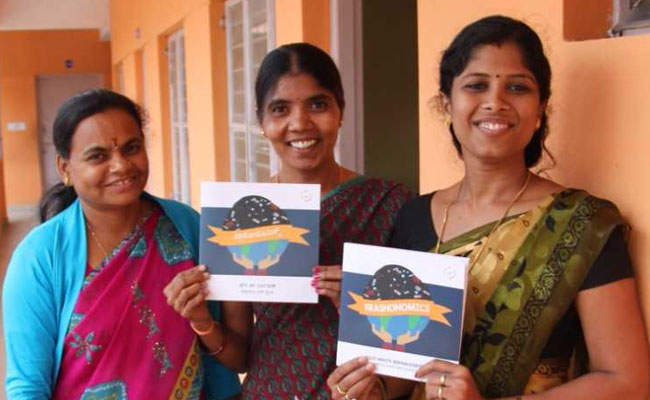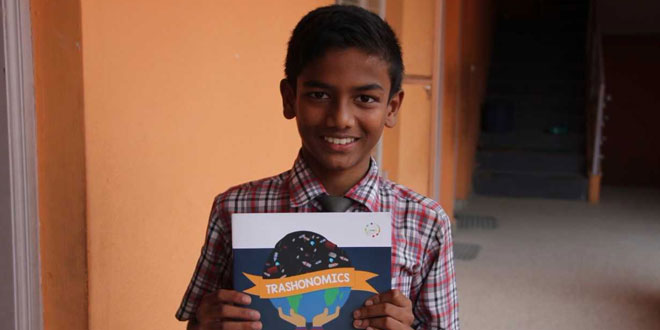Highlights
- Trashonomics aims to simplify the study of waste management
- The book highlights environmental and financial impact of waste disposal
- It is full of fun facts, graphics and pictures to explain waste management
To see a clean India, we have to ensure that our children are honed with proper waste management skills at very young age so that they become socially responsible. That’s the ideology behind the compilation of the book – Trashonomics – a play on the words ‘Trash’ and ‘Economics’. The book aims to simplify the study of waste management, while highlighting its environmental, health and financial impact. Since children are the big change makers, this book aims to empower them to lead the change by redefining the historical narrative on waste as something to be thrown away. The five-chapter book addresses the fundamental principles of effective waste management and is an initiative of Solid Waste Management Round Table (SWMRT), a Bengaluru-based group working in the field of solid waste management since 2009.
Designed for middle and high school students, the book is full of fun facts, graphics and pictures to explain an array of topics such as waste segregation at source (organic, recyclable and sanitary), composting of organic waste, recycling of inorganic waste and its benefits, black spots and life cycle of waste, to name a few.

The book is full of fun facts, graphics and pictures to explain an array of topics on waste management
The harmful effects of burning waste and irresponsible disposal that leads to hazardous living conditions are addressed in depth. The students also trace the life cycles of organic and inorganic waste and understand what goes into recycling it.
Notably, a whole chapter is dedicated on how change of consumption patterns can reduce waste and why we should reduce the use of single-use disposables (plastic water bottles, plastic cups, disposable utensils, plastic bags)and switch to reusables (jute bags, glass bottles and utensils).
And to make the children understand the concepts of waste management in a better way, each chapter in the book comes with a relevant hands-on activity session like how to segregate waste at source, make compost and bury different types of waste that we generate on a day to day basis.
For instance – children are made to bury organic waste (banana peel), plastic (plastic bag), paper cup, laminated foil (chocolate wrapper), and after a month, they would see that the fruit peel and the paper from the cup have decomposed whereas the plastics still remain including the liner of the paper cup. This exercise will help children understand what is biodegradable and what is harmful for the earth.
Another type of activity include research and essay on landfills, which would help the students understand the suffering of the people living around these landfills and why unscientific dumping is not the solution.
Also Read: Children To Play Swachh Messengers In Bengaluru, To Promote Waste Management
Launched by the Karnataka State Pollution Control Board last year, Trashonomics also encourages the students to meet the people who collect and manage their waste and understand the hazards of the job.
The idea behind this activity is to sensitise the students of the efforts put in by waste pickers to keep their city clean, said Archana Kashyap, the co-author of the book and member of SWMRT.

Available in Kannada, English and Hindi, the book addresses the fundamental principles of effective waste management
Just like students are taught math and science in school, they should also be taught about waste management and how recycling works. Our ultimate goal is to make this book a part of the school curriculum as waste management is an absolute skill every child should learn, she said.
One set of books for one class is all that the school needs to invest in. The books can then be passed on to the next class after one class has finished with them, so the children also learn to apply the concept of reuse.
Also Read: A Workshop In Bhubaneswar To Spread The Idea of Waste Management Among Children
Archana along with other volunteers from SWMRT also conduct workshops to teach students about waste management. So far, they have distributed over 4000 copies to students and conducted workshops in as many as 80 governments and private schools. In the workshops, the students are also encouraged to start their own eco club in the school, do composting and if the space permits start a vegetable garden. “By growing vegetables, they would understand the concept of safe food, grown without using any sort of pesticides,” said Archana Kashyap.
Available in Kannada, English and Hindi, Trashonomics will help students take a critical look at household, retail and farming waste, while encouraging them to play an active role in resolving waste management issues in the longer run.






























